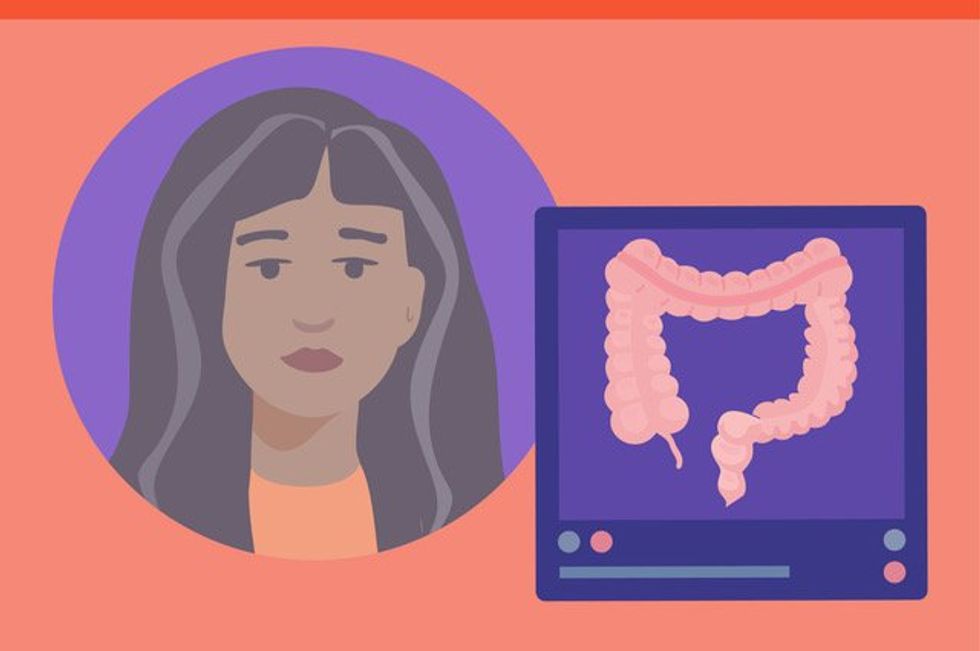

Slide 1
Mental health slots and colon cancer
Living with colon cancer can be difficult for your mental health, but knowing what to expect can help
Slide 2
Waiting for a diagnosis
If you worry about having colon cancer, waiting for an answer can be difficult. While waiting, you can feel:
Slide 3
Anxiety and stress
-
More than 1 in 2 people feel anxious to get a colonoscopy
Fear
-
Fear of cancer is a reason why people avoid being examined, although detection can help prevent cancer.
Slide 4
After a diagnosis
Passing the treatment of colon cancer can cause a wide range of emotions, which include:
Fear
-
It is normal to be afraid and worry about things as if it will have pain, if you can continue working or if you can die.
Anger and frustration
-
People may ask: «Why me?» while it comes to cancer. They can attack against healthy people, including their suppliers and loved ones.
Slide 5
Depression
-
People with colorectal cancer are more likely to deal with depression than those who do not have the disease.
Hope
-
It is common to feel hopeful that the treatment works. It is fine not having a positive attitude 100% of the time, but feeling hopeful when you can help your quality of life during treatment.
Slide 6
After treatment
The relief of overcoming the treatment of colon cancer can also be accompanied by:
Less self -esteem
-
It is normal to feel aware of the changes in the body after the treatment of colon cancer, particularly if it has a bag like a colostomy or ileostomy outside the body that collects waste.
Loneliness
-
Returning to your normal routine can make you feel disconnected from others. You can feel disappointed by how some people handle your illness, or you may feel that nobody really understands what has happened.
Slide 7
Anxiety and stress
-
The relief of having defeated cancer is often followed by the concern that cancer returns. For some people, this fear of recurrence harms their ability to enjoy their life.
Emotion and hope
-
Many people feel that they have been given a «new life opportunity» after successfully completing cancer treatment and are excited about the future.
Slide 8
Healthy ways to face
-
Let it out. Whether you share with a loved one of trust, a support group or a counselor, express your feelings is key.
-
Relax. Deep breathing, full attention and meditation can help reduce stress and anxiety.
Slide 9
-
Move. Regular exercise (even if it is only soft stretching) can increase your mood and relieve anxiety.
-
Grant in what you can control. Being involved in your care and choosing how your time goes out of treatment can help keep your focus on what you can’t control.
Slide 10
Resources
National Cancer Institute – Emotions and Cancer
This educational resource was created with the support of Daiichi Sankyo.
Slide 1
Mental health slots and colon cancer
Living with colon cancer can be difficult for your mental health, but knowing what to expect can help
Slide 2
Waiting for a diagnosis
If you worry about having colon cancer, waiting for an answer can be difficult. While waiting, you can feel:
Slide 3
Anxiety and stress
-
More than 1 in 2 people feel anxious to get a colonoscopy
Fear
-
Fear of cancer is a reason why people avoid being examined, although detection can help prevent cancer.
Slide 4
After a diagnosis
Passing the treatment of colon cancer can cause a wide range of emotions, which include:
Fear
-
It is normal to be afraid and worry about things as if it will have pain, if you can continue working or if you can die.
Anger and frustration
-
People may ask: «Why me?» while it comes to cancer. They can attack against healthy people, including their suppliers and loved ones.
Slide 5
Depression
-
People with colorectal cancer are more likely to deal with depression than those who do not have the disease.
Hope
-
It is common to feel hopeful that the treatment works. It is fine not having a positive attitude 100% of the time, but feeling hopeful when you can help your quality of life during treatment.
Slide 6
After treatment
The relief of overcoming the treatment of colon cancer can also be accompanied by:
Less self -esteem
-
It is normal to feel aware of the changes in the body after the treatment of colon cancer, particularly if it has a bag like a colostomy or ileostomy outside the body that collects waste.
Loneliness
-
Returning to your normal routine can make you feel disconnected from others. You can feel disappointed by how some people handle your illness, or you may feel that nobody really understands what has happened.
Slide 7
Anxiety and stress
-
The relief of having defeated cancer is often followed by the concern that cancer returns. For some people, this fear of recurrence harms their ability to enjoy their life.
Emotion and hope
-
Many people feel that they have been given a «new life opportunity» after successfully completing cancer treatment and are excited about the future.
Slide 8
Healthy ways to face
-
Let it out. Whether you share with a loved one of trust, a support group or a counselor, express your feelings is key.
-
Relax. Deep breathing, full attention and meditation can help reduce stress and anxiety.
Slide 9
-
Move. Regular exercise (even if it is only soft stretching) can increase your mood and relieve anxiety.
-
Grant in what you can control. Being involved in your care and choosing how your time goes out of treatment can help keep your focus on what you can’t control.
Slide 10
Resources
National Cancer Institute – Emotions and Cancer
This educational resource was created with the support of Daiichi Sankyo.






